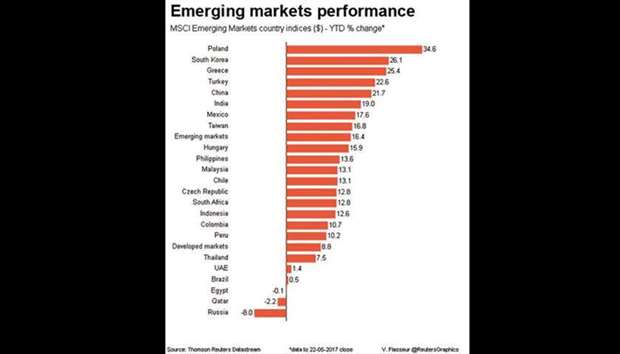Emerging markets slipped yesterday after weaker Chinese import data hinted at economic slowdown in the world’s second-largest economy and Brazil, in political turmoil, was threatened with a credit ratings downgrade.
MSCI’s benchmark emerging market stocks index eased 0.2% after two days of gains, and major emerging currencies such as the Turkish lira and South African rand weakened against the dollar.
Chinese imports of refined copper, which tend to be a barometer of industrial demand, were down 41% in April versus a year ago.
This continues a run of lacklustre data from China.
“One thing we are keeping an eye on is what’s happening in China where the recovery seems to have peaked.
We expect the slower data to continue in coming quarters and that could have repercussions on emerging markets as a whole,” said William Jackson, senior emerging markets economist at Capital Economics.
Chinese bourses were subdued but Hong Kong stocks rose to 22-month highs in moves attributed to flows from Chinese mainland investors.
Brazil’s real steadied after Monday’s fall whilst the Europe-listed Brazil exchange traded fund DBX MSCI Brazil rose 2.7%. President Michel Temer has refused to step down despite a corruption scandal that threatens to tear apart his coalition.
Ratings agency S&P threatened to downgrade Brazil further into junk territory. Brazil has a large weighting in all the major emerging bond and stock benchmarks and sell offs there will hit indexes as a whole.
There is little sign of a spillover so far.
Gerardo Zamorano, a portfolio manager at Brandes Investment Partners, said the initial reaction to the Temer scandal, which sent assets tumbling, had been excessive.
“The fact is Brazil is coming out of recession, we will still see good GDP developments and some year-on-year growth.
We still think interest rates will come down,” he said, adding he had bought some Brazilian shares after the sell off.
The Turkish lira weakened 0.4% as a crackdown on suspected coup-plotters continues, with arrest warrants issued for dozens at the telecoms and capital markets watchdogs, according to CNN Turk.
There were some concerns about Croatia where a 2020 dollar bond from the country’s biggest company Agrokor fell 0.5 cents to 34.5 cents after local suppliers of indebted food and retail giant Agrokor said they would halt deliveries unless some debts are repaid.
“The ongoing crisis at Agrokor in Croatia is increasing risks for (the) sovereign and would be likely to affect sovereign risk pricing in (the) medium-term,” Raiffeisen analysts said in a note.
The South African rand slipped 0.5%, with General Motors saying it would cut 600 jobs as it pulls out of the country.
Central banks in Hungary and Nigeria are expected to keep interest rates on hold later in the day.

